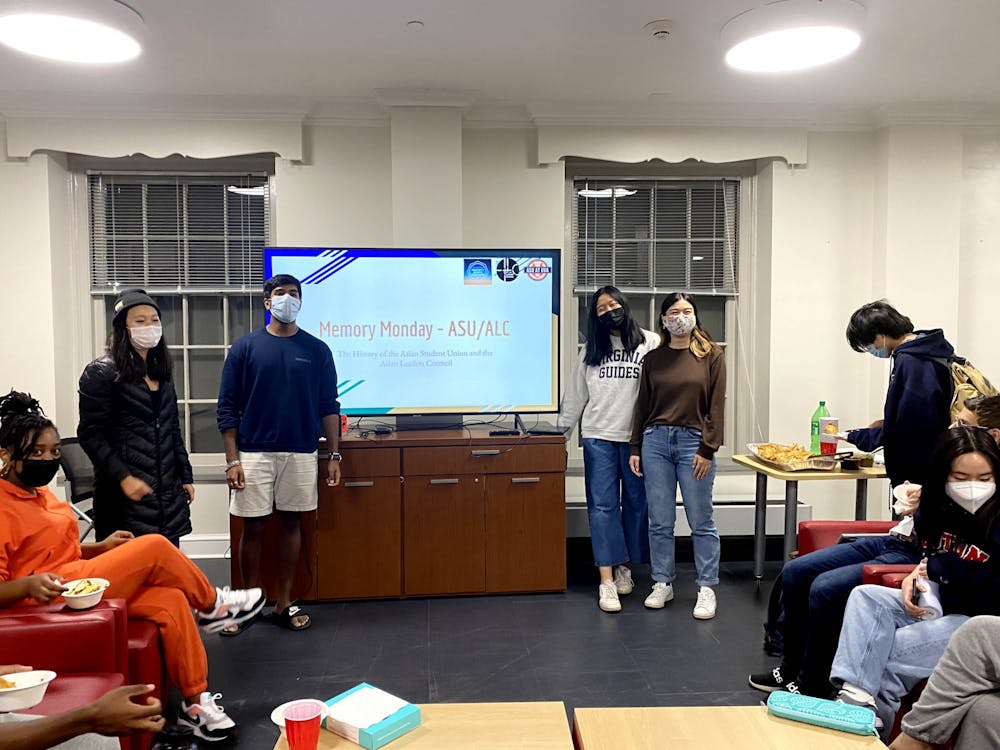The University’s Minority Rights Coalition hosted three speakers from two Asian Student organizations, the Asian Leaders Council and Asian Student Union, on Grounds to speak about their organizations’ histories, activism and future plans.
Serena Wood and Lauren Xue, fourth-year College students and co-chairs of the ALC, along with Sanjeev Kumar, third-year Commerce student and president of ASU, presented to a group of about 20 people in the International Residential College.
The MRC is an organization made up of 11 board member organizations that represent marginalized groups at the University. The MRC focuses on fostering solidarity amongst marginalized and oppressed communities, and its Memory Mondays event series is an educational endeavor designed to put the spotlight on student organizations and activism.
Advocacy Chair of the MRC Amanda Campbell said the Memory Mondays series is an educational endeavor designed to put the spotlight on student organizations and activism.
Prior speakers at Memory Mondays events include Danielle Johnson, president of the Organization of African Students who spoke Oct. 4, and Dani Alvarenga, president of the Cultural Organization for Latin Americans at U.Va., who presented the organization’s advocacy and goals Sept. 20.
Kumar opened the presentation by discussing the long history of the ASU, which was founded in 1988. ASU works to create safe spaces for Asian students and to form a community for Asian students through events such as their annual APIDA autumn, a semi-formal event, as well as other advocacy events.
The organization began advocating for the creation of an Asian and Asian American Studies major or minor at the University in 1995.
Today, the Asian-Pacific American Studies minor has just one professor and one class that is directly related to the minor. ASU is continuing the fight for a full department dedicated to Asian and Asian American Studies, and is also working with the ALC to propose and create an Asian Student Center on Grounds.
“We represent a rapidly growing percentage of the students on Grounds, yet there is very little faculty that are Asian American, or that speak on Asian American Studies,” Kumar said. “[If] we look across the board at deans, administrators, any higher up administration at the University — there is little to no representation there.” Kumar said.
Kumar emphasized the importance of having a center for Asian students on Grounds as well as faculty who can relate to the Asian-American student experience. The creation of an Asian American student center at the University would allow the community to have access to individuals who can push for greater Asian representation in University administration as well as pass Asian American history to new students, according to Kumar.
Kumar said ASU has made strong strides towards being more inclusive by creating a general body so students can join the organization without being required to go through an application process. Now, prospective members must only join a group chat to be in the know for all ASU events.
ASU is also working to move away from a predominantly East Asian focus in its activism — the organization is embracing the diversity of the Asian community by incorporating the experiences of South, South East and Central Asian voices in its advocacy. ASU is making an effort to reach out to South and South East Asian organizations on Grounds to better understand and represent those communities and the issues they face.
“We've been listening to the community a lot more,” Kumar said. “We're trying to listen, figure out what the students as well as different organizations need and target those.”
Wood then introduced the ALC, which began as a committee of the ASU. It broke away in 2015 to form an umbrella group encompassing 17 organizations of Asian students — including ASU. The ALC is both an advocacy group and a force to create community among member organizations.
“We not only function in terms of advocacy on part of the administration but we also try to foster a community environment with other Asian cultural organizations,” Wood said.
One recent project of the ALC involves advocating for the creation of an Asian Studies major, with research based on its 2018 report titled We Are Not Invisible: A Report on Academic Reform, which focused on the need for Asian students to have faculty representation and classes that examine the Asian American experience.
Xue spoke on the importance of translation of financial and legal documents for Asian Americans and acknowledging how systems of oppression impact Asians.
“These very institutional oppressive systems still affect the ways that people have access to financial documents and aid and resources that students are able to access here at U.Va., so that’s really important because language is a barrier,” Xue said.
Another recent endeavor of the ALC is creating the Actualize Zine, a student publication that focuses on addressing the stigma associated with mental illness in the Asian American community. The publication accepts student submissions of art including written pieces, drawings, and paintings.
Like ASU, the ALC is also focusing on goals to increase inclusion for South Asians, South East Asians and Central Asians. The group hopes to foster a more collaborative relationship with the diverse cultural organizations that are members of the ALC.
To conclude the presentation, Campbell reflected on the MRC’s advocacy and her experience with the Memory Monday series at the University.
“It’s been really, really educational,” Campbell said. “That's my favorite part — getting to see all the different organizations and student activism that we have at U.Va.”







